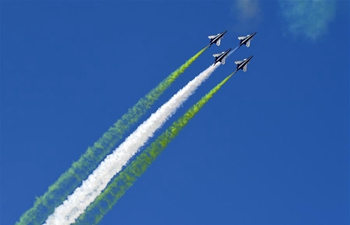DAMASCUS, Oct.27 (Xinhua) -- While the killing of the Islamic State (IS) leader Abu Bakr al-Baghdadi seems a positive step in the war on terror, it's highly unlikely that the group's sleeper cells will cease to exist or completely dissolve anytime soon amid fears they could carry out revenge hits.
On Sunday, U.S. President Donald Trump said that the IS leader was killed in a U.S. military operation in northwestern Syria.
Speaking in the White House, Trump said U.S. Special Operations Forces conducted a raid Saturday night targeting al-Baghdadi in northwestern Syria, during which al-Baghdadi killed himself by igniting a suicide vest.
"Abu Bakr al-Baghdadi is dead," Trump said, adding that the United States had "brought the world's number one terrorist leader to justice."
Trump said al-Baghdadi fled into a tunnel with three of his children and detonated a suicide vest.
"He was a sick and depraved man, and now he's gone," he said.
Al-Baghdadi, 48, whose real name was Ibrahim Awad al-Badri, announced the establishment of a caliphate, or the so-called Islamic State, in June 2014.
In 2016, the U.S. Department of State offered a reward of up to 25 million U.S. dollars for information leading to his capture or death.
Muhammad al-Omari, a Syrian political expert, said that the death of al-Baghdadi could not have a big impact on the IS, noting that such groups could quickly find alternatives and could carry out swift revenge operations to grab headlines and draw in new sympathizers and members.
He said the group could expand the revenge operations beyond Syria and Iraq.
Omari said the death of al-Baghdadi could also cause a schism in the ranks of the IS and could cause the group to be fragmented into several formations.
However, it's unlikely that the group could carry out major hits as it has been largely defeated in Syria and Iraq and only sleeper cells are located in the Syrian desert and some areas in Idlib, where he was located and killed.
After the death of al-Baghdadi, it's expected the group could appoint one of two candidates either the Saudi IS member Abu Abdul Rahman Al-Jizrawi or the French Abu Othman, according to the pan-Arab al-Mayadeen TV.
The TV said that the nature of the group's structure now and the scattering of its members could prolong the process of choosing a successor to al-Baghdadi but it's highly likely they will choose the Al-Jizrawi.
It said al-Baghdadi was planning to revive the group in Idlib, given the state of lawlessness and decentralized rebel groups in that province, which is the last major rebel stronghold in Syria.
The report added the group could rely on sleeper cells to carry out operations in areas that suffer from weak security such as Yemen and Libya.
IS establishment could date back to 2006 when al-Qaida announced the creation of the Islamic State in Iraq (ISI).
Its notorious militants then crossed the borders and posed an imminent threat to the fabric of the societies in the Arab world.
In early 2013, the ISI entered Syria and participated in the civil war against the government of Syrian President Bashar al-Assad. It later declared its merger with an al-Qaida-linked group in Syria, known as al-Nusra Front, under the new name of Islamic State of Iraq and Levant (ISIL).
In February 2014, the al-Qaida organization said it had cut links with the militant group ISIL led by al-Baghdadi. In June 2014, the ISIL, which had seized large areas in Syria and Iraq, declared the establishment of the caliphate Islamic rule and changed its name to IS.
The group has started its decline in 2017 with consecutive defeats in several Syrian areas, mainly its de fact capital of Raqqa in northern Syria.
Nowadays, IS members are scattered in the remote eastern Syrian desert after their defeat in the eastern Euphrates River region earlier this year.

















